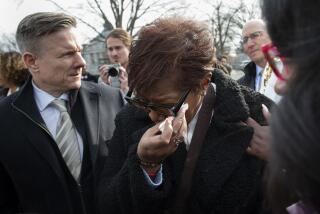City to Pay Man Shot by Police
- Share via
A man who was shot after threatening a police officer with a knife will receive more than $3 million, because the Los Angeles city attorney’s office fears a jury verdict might cost taxpayers more.
The Los Angeles City Council voted Tuesday to settle the lawsuit, despite three separate findings that LAPD Officer Kelly Stallings did nothing wrong when she fired while defending herself.
The man with the knife, Lawrence Friedman, was living in Amigo House, a Northridge home for patients with mental disabilities, when the shooting in 1994 left him a paraplegic.
“It’s very, very painful to have to do that,” Councilwoman Laura Chick said of her vote, “but it was very clear that it wasn’t a perfect situation, that no errors of judgment were made. But to take this further was putting taxpayer dollars at greater risk.”
The settlement was recommended by a retired judge who served as a mediator, according to the city attorney’s office.
A jury might have sympathized with Friedman, a developmentally disabled man who was left to spend his life in a wheelchair, requiring 24-hour care, said Mike Qualls, a spokesman for the city attorney’s office. The city agreed to pay $3.25 million.
“We had a situation where we had a number of conflicting witnesses who had different versions of what happened,” Qualls said. “There was no physical evidence to prove which person had the correct version.”
The Police Commission, the chief of police and a use-of-force review board all concluded that the evidence showed that Stallings acted in defense of her life when she fired her weapon on an advancing man with a knife.
The council should have fought the case, said Dennis Zine, a director of the Police Protective League.
“When the City Council doesn’t show support in fighting those kinds of cases, it is demoralizing to officers,” said Zine, who last worked in the Los Angeles Police Department’s West Valley Division.
Stallings, who has since transferred to the Scientific Investigation Division, was with another officer when they responded to a call at 11 p.m. Oct. 8, 1994, that an employee of Amigo House was involved in a domestic dispute with a girlfriend.
At the house, Friedman walked out, holding a knife extended at officers and yelling, “I’ll kill you, I’ll kill you all. Get out of here,” according to a report by the former Police Chief Willie Williams.
The officers ordered Friedman to drop the knife, but he refused to comply and continued to advance on them, the report said.
As the officers moved back, Friedman stopped and then paced back and forth, before advancing more rapidly on Stallings. She shot Friedman once, but when he continued to advance, shot him twice more.
Williams ordered the officers to undergo additional training in tactics, saying he would have preferred that they had considered using nonlethal force.
But Williams found the shooting justified, writing: “I have determined Officer Stallings reasonably believed she was in immediate danger of being seriously injured or killed.”
Friedman was arrested on suspicion of assault on a police officer, but the district attorney’s office declined to file charges “due to his limited mental capacity” and his injuries, the police report said.
The lawsuit alleged officers violated Friedman’s civil rights by using “unreasonable, unnecessary and deadly force,” and by shooting Friedman when they “knew or reasonably should have known” that he was “developmentally disabled, not armed or dangerous and/or posed no immediate threat to defendants.”
Councilwoman Ruth Galanter said she too was convinced by the city’s attorneys in closed session to settle rather than fight the case in court.
“We were pretty well persuaded by the combination of the Police Department’s review and the attorney assessment of the case that it would be a good idea to settle,” Galanter said.
More to Read
Sign up for Essential California
The most important California stories and recommendations in your inbox every morning.
You may occasionally receive promotional content from the Los Angeles Times.










